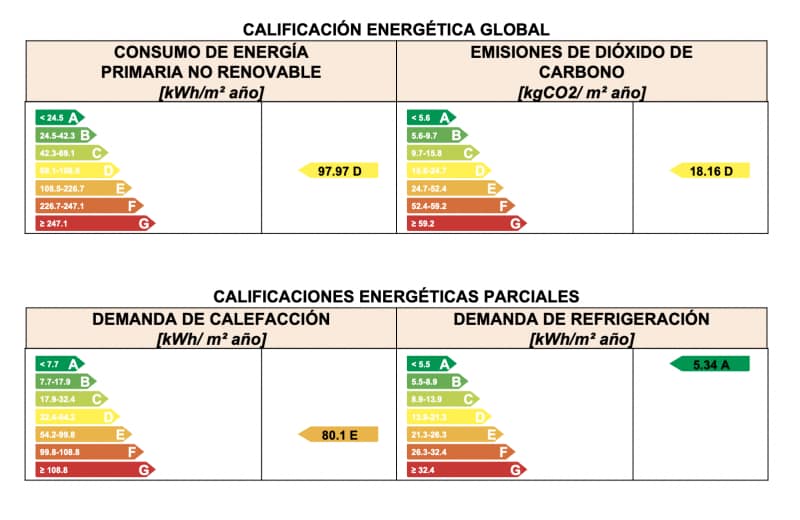What It Means for Homeowners, Squatters, and the Housing Crisis
Spain is stepping up its efforts to improve energy efficiency in buildings, driven by climate commitments and EU regulations. Over the next few years, significant changes are set to reshape the housing landscape. By 2030, properties will need to meet a minimum energy rating of E to be sold or rented legally. Looking further ahead, by 2033, the regulations will rise to require at least a D rating.
However, many property owners are in the dark about their current energy performance. Most properties haven’t been officially rated unless owners recently decided to sell—meaning that a significant number of homeowners do not even know their current rating.
If you don’t have a recent energy certificate, the first step is to get one. Knowing your property’s rating is critical to assess what upgrades are may need and how urgent the situation is.
The Costly Reality of Upgrades for Older Homes
Retrofitting older houses, some centuries-old, can be expensive. Upgrades like insulation, double glazing, renewable energy systems, and other efficiency measures cost thousands, sometimes tens of thousands of euros. For pensioners, low-income owners, or those in rural areas, these costs can often be prohibitive.
What could happen to properties rated below E?
- They could be effectively barred from the market, making them impossible to sell or rent without the upgrades.
- Owners may face legal restrictions or fines.
- Many owners might be forced to abandon these homes when they can’t afford the necessary upgrades, leading to increased vacancies and neighbourhood decline.
The Unintended Consequences: A Rise in Abandonment and Squatting
Could this regulation push more homeowners to abandon their properties?
History and current trends suggest yes. When owners are unable to afford retrofits, some may leave, letting their homes fall into disrepair or become targets for squatters. This can accelerate urban decay, especially in rural regions or neglected urban neighbourhoods.
Socially, this could mean a rise in squatting, the loss of cultural heritage, and increased social tensions in vulnerable communities—especially where legal pathways for affordable housing are limited.
The Housing Market and the Shortage of Rental Properties
Properties left vacant or legally unmarketable due to inadequate energy ratings will further shrink the housing stock. This reduces opportunities for rental and sale, adding to Spain’s existing housing shortages in many regions.
- Rents could rise, further squeezing tenants already struggling.
- Illegal occupancy and squatting may increase, prompting stricter enforcement, which impacts law-abiding tenants and owners alike.
Who Pays the Price?
Elderly homeowners, low-income families, and young buyers are the most vulnerable. Without affordable retrofit options and government support, many may put themselves at risk—either by being unable to sell, rent, or maintain them in compliance with future regulations.
A Turning Point in Housing Policy?
Some policymakers are aware of these issues and are debating solutions like subsidies, low-interest loans, or community retrofit schemes. The goal: help owners upgrade their homes without losing ownership.
But the key challenge remains: How to balance environmental goals with social fairness?
The Urgency – Act Now Before It’s Too Late
Time is running out.
We have less than 5 years before the first milestone, E rating minimum standard in 2030. The time to act is now, not in 2029. That will be too late. We urge people to start looking at their own personal situation and any family members who have houses that are below the minimum grading.
The very first step is simple but crucial:
- Get your property assessed and obtain an energy certificate if you don’t already have one.
- Understand your current rating and the specific improvements needed.
- Start planning and budgeting for upgrades today, because waiting could mean higher costs, limited options, or restrictions on your ability to sell or rent your home.
Community action is vital.
If you own an apartment building, a complex, or multiple homes, now is the time to hold collective meetings. Discuss the property’s energy performance, coordinate upgrades, share resources, and apply for grants or subsidies together. Early planning and coordinated efforts can significantly reduce costs and ensure everyone meets the deadlines comfortably.
Final thoughts
Spain’s push for more energy-efficient homes by 2030 and 2033 is a worthy goal, but it poses risks if not managed carefully. Many homeowners, especially those with older properties, face a challenging future. The most vulnerable could face the hardest challenges with these new laws coming into effect so it’s
The crucial message:
The time to act is now. Know your current rating, start planning your upgrades, and engage with your community and family members. Early preparation is the best way to protect your home, your investment, and your loved ones.




